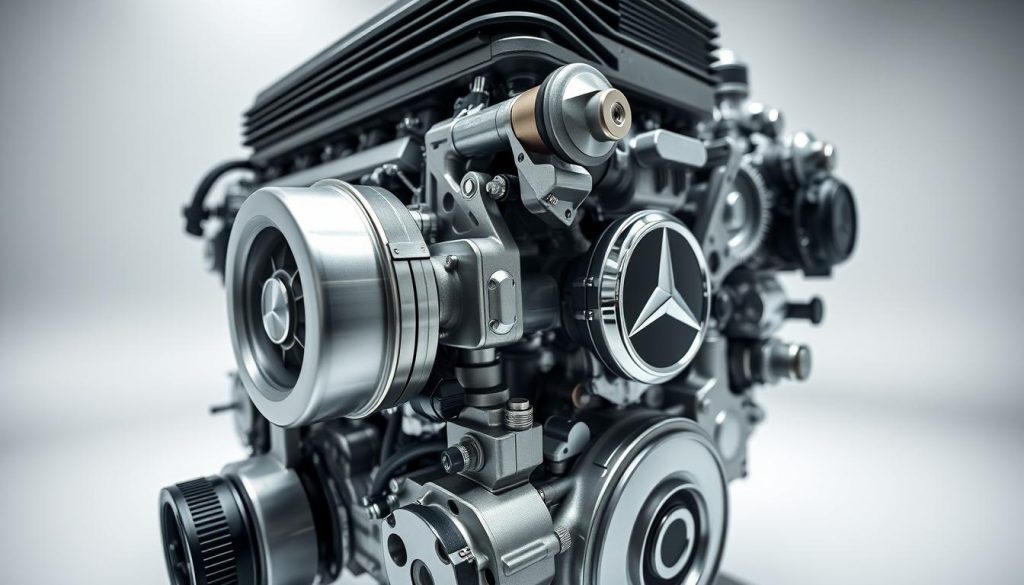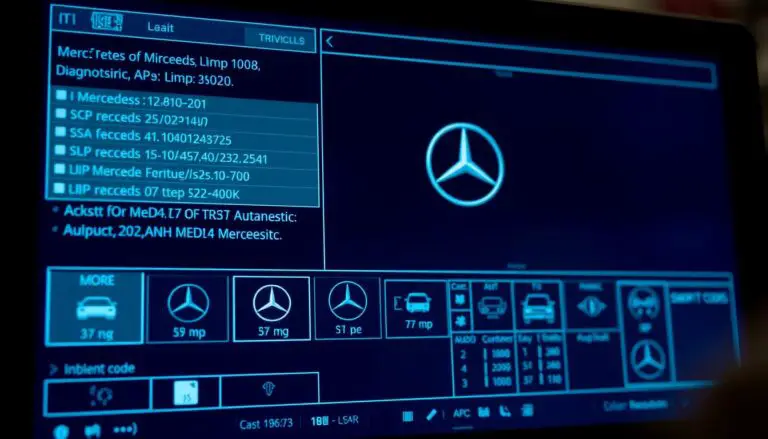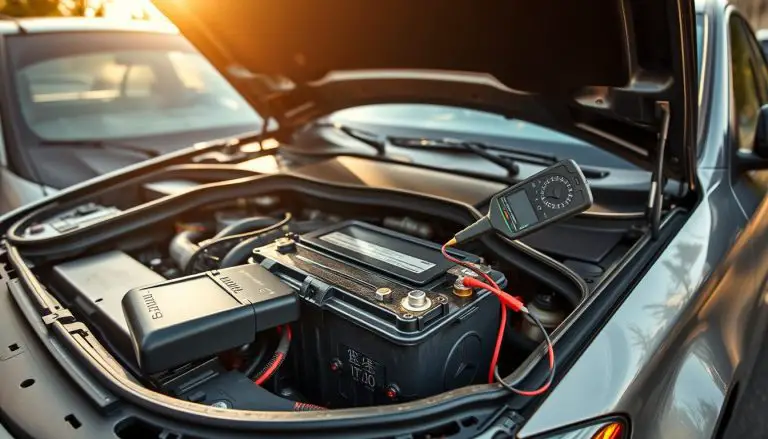The Mercedes M276 engine, celebrated for its superior performance and efficiency, stands as a cornerstone within the Mercedes vehicle lineup. Its reliability is of utmost significance to both car owners and aficionados, underscoring its critical role in the automotive landscape.
This exhaustive review endeavors to dissect the M276 engine’s reliability, scrutinizing its merits and demerits alongside its overall performance. Through a meticulous examination of its various facets, we aim to illuminate the expectations surrounding this formidable engine.
Key Takeaways
- Overview of the Mercedes M276 engine’s performance and efficiency
- Analysis of the engine’s reliability and common issues
- Insights into maintenance and repair strategies
- Comparison with other engine models
- Recommendations for potential buyers and current owners
Overview of the Mercedes M276 Engine
The Mercedes M276 engine stands as a testament to the company’s relentless pursuit of engineering excellence. It epitomizes the harmonious blend of performance and efficiency, marking a pivotal moment in Mercedes’ history.
Engine Development and History
Mercedes embarked on a mission to elevate its engine portfolio with the M276, a venture aimed at merging power with efficiency. Introduced in the early 2010s, this engine heralded a new era, integrating cutting-edge technologies to bolster performance while curtailing emissions. The primary objective was to craft an engine that would transcend model boundaries, embodying versatility and potency.
Vehicle Applications and Model Years
The M276 engine’s versatility has seen it power a spectrum of Mercedes models, from the E-Class to the S-Class, spanning multiple model years. Its adaptability and robust performance have cemented its status as a preferred choice across various applications. For a comprehensive breakdown of the M276’s deployment across Mercedes’ lineup, enthusiasts frequently consult forums such as MBClub.co.uk.

| Model | Model Years | Engine Configuration |
|---|---|---|
| E-Class | 2013-2016 | V6 |
| C-Class | 2012-2015 | V6 |
| S-Class | 2013-2017 | V6 |
Technical Specifications and Design
The M276 engine epitomizes a fusion of robust design and advanced technology, distinguishing itself within its category. Its technical specifications underscore Mercedes’ dedication to innovation and performance excellence.
Engine Architecture and Displacement
The M276 engine boasts a double overhead camshaft (DOHC) design and a displacement of 3.0 liters. This configuration is pivotal for achieving optimal performance and efficiency. Constructed with a robust block and cylinder head, the engine’s design ensures durability and reliability.
Power and Torque Outputs
The M276 engine showcases remarkable power and torque outputs. It generates between 248 horsepower and 329 horsepower, contingent upon the specific application. The engine’s torque output spans from 251 lb-ft to 354 lb-ft, making it versatile for various Mercedes models.
Innovative Technologies
The M276 engine incorporates several cutting-edge technologies, including a direct injection system and variable valve timing. These innovations significantly enhance the engine’s performance, efficiency, and emissions.
Direct Injection System
The direct injection system ensures precise fuel delivery, leading to improved combustion efficiency and reduced emissions. This technology optimizes engine operation, enhancing efficiency.
Variable Valve Timing
The variable valve timing system enables optimal valve operation across a range of engine speeds. This results in superior performance, fuel efficiency, and reduced emissions.

Mercedes M276 Engine Reliability: Common Issues
The Mercedes M276 engine, celebrated for its high performance, has encountered several reliability challenges. It is imperative for both current proprietors and prospective buyers to comprehend these prevalent problems.
Timing Chain Problems
Timing chain malfunctions represent a significant concern with the M276 engine. Premature wear and stretching of the timing chain can precipitate engine performance anomalies and necessitate expensive repairs if not rectified expeditiously.
Oil Consumption Concerns
Excessive oil consumption has been a recurring issue among M276 engine owners. This problem can stem from various causes, including piston ring malfunctions or faulty seals. It is crucial to conduct regular oil level assessments to detect this issue early.
Cooling System Weaknesses
The cooling system’s integrity is paramount for engine longevity. The M276 engine’s cooling system has exhibited vulnerabilities, mainly concerning thermostat failures and water pump malfunctions.
Thermostat Failures
Thermostat malfunctions can result in engine overheating, which can cause substantial damage. Regular maintenance and inspection of the thermostat are vital to avert such problems.
Water Pump Issues
The water pump is another component susceptible to failure. A malfunctioning water pump can induce engine overheating, leading to expensive repairs. Attentiveness to unusual noises emanating from the water pump area can serve as an early warning sign of potential failure.
| Common Issue | Description | Potential Consequence |
|---|---|---|
| Timing Chain Problems | Premature wear and stretching | Engine performance issues, costly repairs |
| Oil Consumption Concerns | Piston ring or seal issues | Engine damage, increased emissions |
| Cooling System Weaknesses | Thermostat or water pump failure | Engine overheating, significant damage |
Performance Characteristics
The M276 engine embodies a synergy of acceleration, response, and fuel efficiency, establishing a benchmark for contemporary engines. Its performance is a direct result of cutting-edge technology and a robust design.
Acceleration and Response
The M276 engine distinguishes itself with exceptional acceleration and a responsive demeanor. Available in a spectrum of power outputs, it promises a driving experience that is both smooth and potent. The synergy of direct injection and turbocharging enhances its impressive responsiveness.
Fuel Efficiency
Notwithstanding its formidable performance, the M276 engine showcases impressive fuel efficiency. This is a result of pioneering technologies like stop-start systems and optimized engine management.
City and Highway Consumption
Fuel consumption patterns fluctuate based on driving environments. In urban settings, the M276 engine demonstrates commendable fuel economy. On highways, its efficiency is even more pronounced.
Real-world vs. Manufacturer Claims
Actual fuel efficiency can diverge from manufacturer projections. Variables such as driving habits and vehicle condition significantly influence real-world fuel consumption.
| Driving Condition | Fuel Consumption (mpg) |
|---|---|
| City | 22-25 |
| Highway | 30-35 |
Maintenance Requirements and Costs
The maintenance regimen for the Mercedes M276 engine is paramount for its longevity and performance. Adherence to a regular maintenance schedule is not merely a precaution but a necessity to ensure the vehicle’s optimal functioning. It also serves as a preventive measure against the financial burden of unforeseen repairs.
Recommended Service Intervals
Service intervals for the M276 engine are meticulously outlined to preserve its integrity. Mercedes-Benz advocates for oil changes at intervals ranging from 10,000 to 15,000 miles. It is imperative to refer to the owner’s manual for precise guidance, as the specific requirements of your vehicle may vary.
Common Maintenance Procedures
Maintenance tasks for the M276 engine encompass oil changes, tire rotations, and the replacement of brake pads. The engine’s timing chain necessitates regular inspections as part of a comprehensive maintenance regimen.
Long-term Ownership Costs
Long-term ownership expenses for the M276 engine are influenced by several variables, including fuel efficiency, maintenance frequency, and repair costs. While the initial acquisition cost is a substantial factor, it is equally important to consider the ongoing expenses for effective budgeting.
Dealer vs. Independent Shop Servicing
Owners of M276 engines have the option to service their vehicles at either dealership service centers or independent repair shops. Dealerships provide specialized knowledge but at a premium cost. In contrast, independent shops offer more competitive pricing, appealing to those seeking cost-effective solutions.
Parts Availability and Pricing
Genuine Mercedes parts are generally more costly than aftermarket alternatives. The superior quality and warranty offered by genuine parts, though, may justify the higher expense. Owners must evaluate their specific needs and budget to make an informed decision.
Pros and Cons of the M276 Engine
An in-depth analysis of the M276 engine’s advantages and disadvantages is imperative for both prospective buyers and current proprietors. The engine’s architecture and technological innovations significantly influence its performance and dependability.
Advantages
The M276 engine boasts several pivotal benefits, encompassing:
Performance Benefits
- Enhanced Acceleration: The incorporation of advanced technology ensures a dynamic and potent driving experience.
- Smooth Operation: Renowned for its quiet and seamless operation, the M276 engine significantly enhances driving comfort.
Durability Highlights
- Reliable Construction: The engine’s sturdy design underpins its enduring durability.
- Longevity: With diligent maintenance, the M276 engine can attain substantial mileage without encountering significant malfunctions.
Disadvantages
Notwithstanding its merits, the M276 engine also harbors certain drawbacks:
Reliability Concerns
- Timing Chain Issues: Certain iterations have encountered timing chain-related problems, compromising engine reliability.
- Oil Consumption: Specific versions of the M276 engine exhibit elevated oil consumption, deviating from expectations.
Cost Implications
- Maintenance Costs: Despite its general reliability, repairs for the M276 engine can incur substantial expenses.
- Fuel Efficiency: The engine’s fuel efficiency is variable, with some models failing to meet anticipated MPG standards.
Recommendations for Potential Buyers and Current Owners
The Mercedes M276 engine, celebrated for its superior performance and efficiency, necessitates meticulous evaluation for those contemplating acquisition or maintenance of a vehicle equipped with this engine. A comprehensive understanding of its reliability, prevalent issues, and upkeep necessities is imperative for a fulfilling ownership experience.
Pre-Purchase Inspection Checklist
For prospective buyers, a detailed pre-purchase inspection is indispensable. Key areas to concentrate on encompass:
- Assessment of the timing chain’s condition and tension
- Examination for any indicators of oil leaks or consumption anomalies
- Review of the cooling system’s integrity and historical data
These evaluations are instrumental in uncovering potential problems at an early stage, offering a more accurate assessment of the engine’s overall condition.
Preventative Maintenance Tips
For current owners, adherence to regular maintenance is crucial to forestall common maladies. This entails:
Regular Oil Changes
Employment of the recommended oil type and adherence to specified change intervals can profoundly influence the engine’s longevity.
Essential Upgrades
Upgrading certain components, such as the timing chain tensioner, can significantly augment the engine’s dependability and performance.
Warning Signs to Monitor
Recognition of unusual noises, diminished performance, or dashboard warning lights is critical for timely intervention, averting major issues.
| Maintenance Task | Interval | Importance |
|---|---|---|
| Oil Change | Every 5,000 to 7,500 miles | High |
| Timing Chain Inspection | At 50,000 miles | Medium |
| Cooling System Check | Every 15,000 miles | High |
Conclusion
This exhaustive review of the Mercedes M276 engine has meticulously dissected its technical attributes, performance metrics, and reliability issues. The analysis underscores the engine’s cutting-edge technologies and commendable power outputs, yet it also exposes its vulnerabilities, including timing chain malfunctions and oil consumption anomalies.
The summary of the M276 engine review underscores the necessity of adhering to recommended maintenance protocols and addressing potential issues expeditiously. Such proactive measures are imperative to harness the engine’s performance potential while mitigating the likelihood of expensive repairs.
In conclusion, the Mercedes M276 engine, with its intricate design and high-performance capabilities, necessitates meticulous maintenance and vigilant attention to detail to guarantee its reliability. By prioritizing its upkeep, owners can derive immense satisfaction from their vehicle’s performance.
FAQ
What are the most common issues with the Mercedes M276 engine?
The Mercedes M276 engine frequently encounters problems with the timing chain, oil consumption, and cooling system weaknesses. These include thermostat failures and water pump malfunctions.
How often should I service my Mercedes M276 engine?
Mercedes advises regular servicing of the M276 engine, typically every 10,000 to 15,000 miles. This interval may vary based on driving conditions and the model year.
What are the benefits of direct injection in the M276 engine?
The direct injection system in the M276 engine enhances fuel efficiency, boosts power output, and minimizes emissions. It injects fuel directly into the combustion chamber.
How does the variable valve timing system work in the M276 engine?
The variable valve timing system in the M276 engine adjusts the timing of intake and exhaust valves. This optimization enhances engine performance, fuel efficiency, and reduces emissions.
What are the long-term ownership costs associated with the M276 engine?
Long-term ownership of the M276 engine involves maintenance and repair expenses, fuel costs, and potential costs for addressing reliability concerns. These include timing chain problems.
Can I service my M276 engine at an independent shop or must I go to a dealership?
While Mercedes dealerships are recommended for servicing the M276 engine, many independent shops possess the necessary expertise and equipment. They can perform routine maintenance and repairs.
What are some essential upgrades for the M276 engine?
Essential upgrades for the M276 engine include software updates, performance tuning, and replacement of worn or faulty components. These upgrades may involve the timing chain tensioner.
What warning signs should I monitor to prevent engine damage?
Monitor for unusual noises, decreased performance, and dashboard warning lights. These signs can indicate engine issues, such as timing chain problems or cooling system failures.
How does the M276 engine’s performance compare to other engines in its class?
The M276 engine’s performance is competitive with other engines in its class. It offers a balance of power, torque, and fuel efficiency. Real-world performance may vary based on driving conditions and model year.
What are the implications of oil consumption concerns on the M276 engine’s reliability?
Oil consumption concerns can negatively impact the M276 engine’s reliability. They can cause engine damage, such as worn piston rings or cylinder walls, if not addressed.


